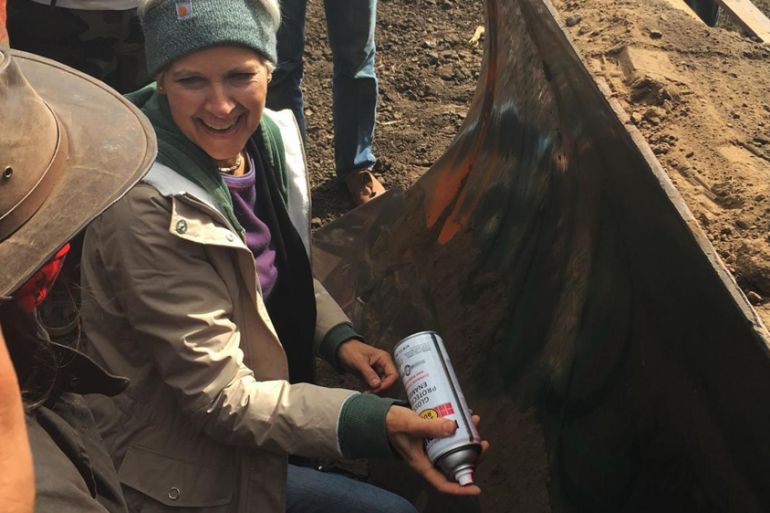Outrage as Dakota oil pipeline construction resumes
US federal court denies Native American tribe’s appeal against pipeline threatening water supply and cultural sites.

A US federal court has denied a Native American tribe’s appeal for an injunction to block the construction of the Dakota Access crude-oil pipeline near their reservation in the US state of North Dakota, which they say could lead to the destruction of culturally sacred sites and contaminate their water supply.
Energy Transfer Partners, the Texas-based company building the pipeline that runs through four states and has been largely completed, confirmed in a statement on Tuesday that construction will resume in the vicinity of Lake Oahe, a Missouri River reservoir that is the water supply for the Standing Rock Sioux Tribe’s reservation.
Keep reading
list of 4 items‘No choice’: India’s Manipuris cannot go back a year after fleeing violence
Photos: Indigenous people in Brazil march to demand land recognition
Holding Up the Sky: Saving the Indigenous Yanomami tribe in Brazil’s Amazon
“In light of Sunday’s court decision, Dakota Access looks forward to a prompt resumption of construction activities east and west of Lake Oahe on private land,” the company said. “We reiterate our commitment to protect cultural resources, the environment and public safety.”
Vicki Granado, the company’s spokeswoman, declined to say exactly when construction of the $3.8bn, 2,500km pipeline – which will carry almost half a million barrels of oil a day from North Dakota to Illinois – would resume.
The work area is about 40km from the so-called Red Warrior Camp, where thousands of protesters have gathered in recent months.
The Standing Rock Sioux want construction halted because of concerns about potential contamination of its water supply and say the pipeline will encroach on tribal burial sites and other cultural artifacts.
In early September, tribal officials accused construction crews of bulldozing several sites of “significant cultural and historic value”, leading to a clash between protesters and private security guards hired by the pipeline company. No one was arrested, but least 30 people were pepper-sprayed.
WATCH: Pipeline standoff at Standing Rock
Dallas Goldtooth, a spokesman for the Indigenous Environmental Network, recently told Al Jazeera that spillage from the pipeline would be inevitable.
“It’s not a matter of if a pipeline spills, but when a pipeline spills. You have significant risk to a vast amount of drinking water supplied to North Dakota, South Dakota, Iowa … all the way down.”
Tribal officials also fear the underground passage would break federal laws under the National Historic Preservation Act that protect sacred prayer and burial sites.
|
|
| Native American tribe takes oil fight to UN |
“There’s a spirit wakening where our kids are going to find their way back to these sites. But if these sites are destroyed and gone, it’s all for nothing. So that’s the most important thing – for future generations to connect with who we are,” David Archambault II, the Standing Rock Sioux tribal chairman, has told Al Jazeera.
Protesters will discuss nonviolent measures to oppose the resumption of construction, camp spokesman Cody Hall said on Tuesday. Methods might include chaining themselves to equipment, as they have done in the past.
“The people are going to stay vigilant. They’re going to fight this pipeline to the very end,” he said.
Thousands of people have joined the protest in support of the tribe. Of the protesters, 123 people have been arrested since mid-August, including the actress Shailene Woodley and Jill Stein, the Green Party presidential candidate.
Energy Transfer Partners still needs approval from the US Army Corps of Engineers to work on a separate parcel of federal land bordering and under Lake Oahe, which the agency manages.
The Corps said on Monday that it was not ready to give that approval because it is still reviewing whether reforms are needed in the way tribal views are considered for such projects.